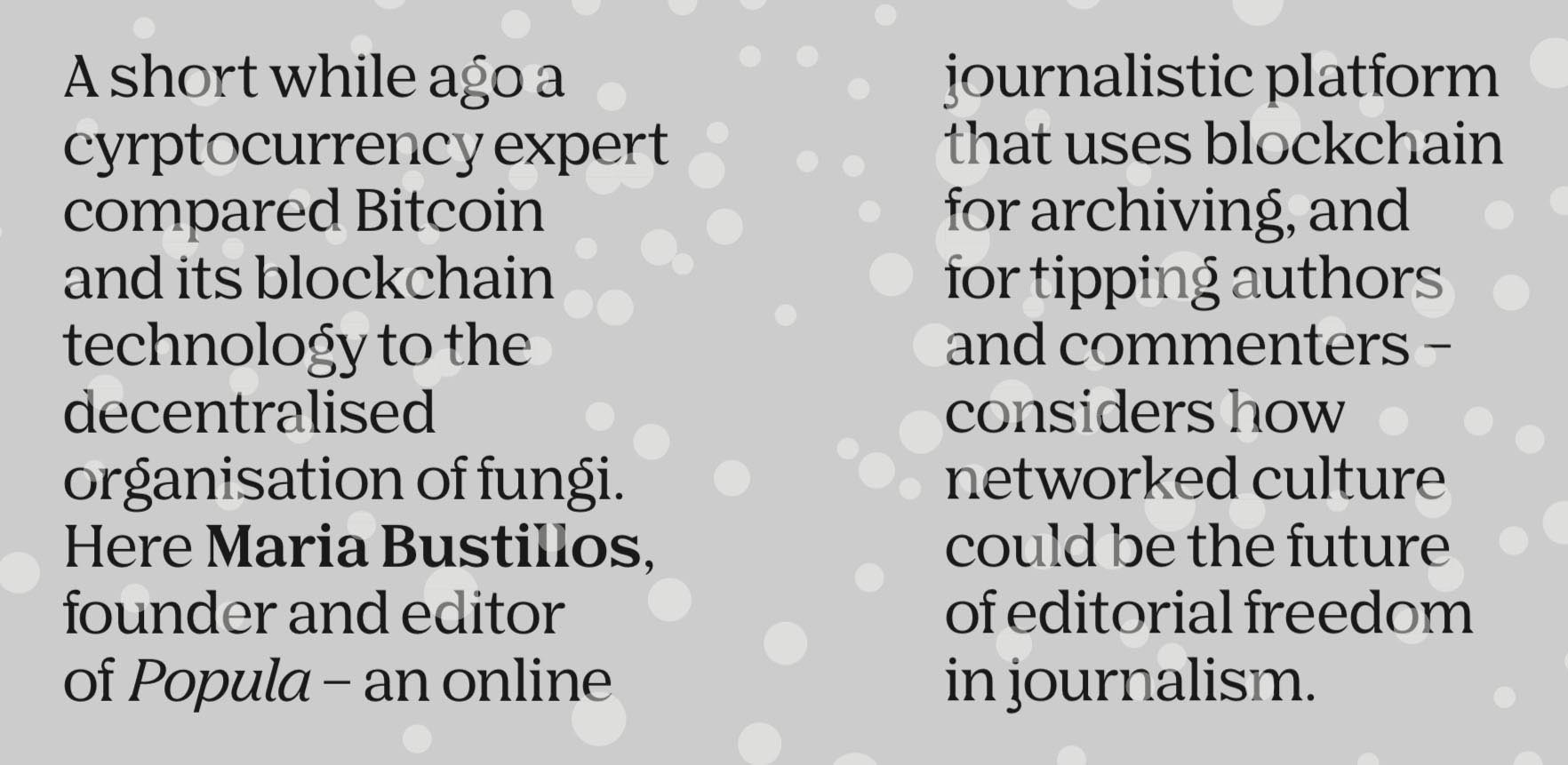Victory Against the Matrix
Maria Bustillos

Toward the end of September 2019 Jaron Lanier, a computer pioneer often referred to as “the father
of virtual reality” published a video opinion piece in the New York Times called Jaron Lanier Fixes the Internet. It’s a three-part primer expanding on ideas Lanier has written about for a long time, notably in his 2013 book Who Owns the Future?
The linchpin of Lanier’s vision is that people should be paid for sharing their data. According to him, this innovation would solve the problems of the World Wide Web as it is currently constituted. But exactly how people (symbolized in the video by a handsome couple in a very large loft, celebrating the arrival of what is quite clearly a plastic baby) will “make money” by sharing their personal news is left entirely undefined. In the video, three one-dollar bills float down to the happy couple from an undisclosed source above them.
“We’ll have to invent a lot of things,” Lanier says breezily.
I totally agree with Lanier that people should be compensated for their participation online in order to restore a fair and egalitarian spirit to the global human network that constitutes the Web. I also agree that “we’ll have to invent a lot of things” to get there and in fact have gone ahead and invented some, with the help of our talented friends and colleagues at Popula. Where Lanier and I differ is that I believe it will be necessary to ensure that middlemen are eliminated, so that nobody can get rich from this new and better network. The complete elimination of the middleman is the only way to protect privacy, speech rights, and press freedom.
Ideas similar to Lanier’s have long been taking shape in various forms around the internet, particularly since the introduction of Bitcoin in 2009. Blockchain technology provides an attractive vehicle for this type of innovation because it was invented specifically in order to produce an incorruptible recordkeeping system, and (relatedly) because of its spectacularly brilliant, efficient means of handling currency-like transactions.
The Brave browser, for example, a blockchain-based system with its own token (called BAT), compensates users for the attention they pay to advertisements. Ad networks pay Brave, and Brave shares a portion of these funds with users of their browser, keeping a cut for itself.
But both Brave and Lanier's proposed system interfere with the organic operations of the network by introducing a central authority — a platform, middleman, or gatekeeper — perhaps a better word would be “ruler.” The ruler has the ultimate power to control the flow of information, commerce and power within the network. The role of the ruler is, eventually and invariably, to arrogate profits to itself, reducing network participants to virtual sharecroppers or worse.
This problem has eventually emerged in every large platform: Google, Paypal, Facebook, Amazon, eBay. Where there is the power to control interactions within the network, and money to be gained thereby, the network ceases to exist as such. Eventually, inevitably, its organic functions degrade into the ultimate role, specifically, as a source of fuel for the ruler. The rulers begin as ad-free, low-cost providers of necessary services, but slowly devolve into bloodsuckers. There’s no reason to believe that the same won’t happen to Brave, as it will to the system Lanier describes. So long as there is a middleman to skim something from each transaction, that system will eventually devolve into another Facebook or Google; rather than serving people’s interest, people will be made to serve theirs.
One possible way to combat this tendency is to eliminate the middleman entirely, as we’ve done at our tiny publication, Popula. Popula is an independent magazine of global news and culture, whose equity is owned by the people who work there; 100% of the company’s ownership will remain in trust for them for as long as the project exists. This means that nobody can get rich from it, or buy it, or invest in it, or buy ads in it. By this means we ensure Popula’s complete editorial freedom, and also protect the project from the control of would-be censors and/or profiteers. The only money that flows into the project comes from readers and direct donations, and they receive nothing in return except the continued existence of the project.
We’ve also designed a system whereby authors can receive tips (in ETH cryptocurrency) directly from readers. Popula takes no cut of these transactions. Because crypto is so frictionless, tips can be very small and delivered at minimal cost. Paying subscribers can make comments on any piece, and those comments are themselves eligible for tips. Popula’s small cryptoeconomy, which is administered through a WordPress CMS, shows how moderation costs can be lowered, how to enable a more egalitarian flow of resources within the network, and how even a small publication can offer these benefits sustainably.

There’s a lot of nostalgia now for the World Wide Web of the 1990s, before the platform companies began to turn the internet into a surveillance machine and a petri dish for authoritarianism, before they’d begun torpedoing the world’s democracies. What began as an organic network comprised of free individuals, a naively diverse and egalitarian ecosystem, in about fifteen years succumbed to the opportunistic strain of monopolistic activity represented by the likes of Steve Jobs, Eric Schmidt and Mark Zuckerberg.
As a veteran of Internet 1.0 who founded my first commercial website more than twenty years ago, I’ve watched all this happen with increasing alarm. But the free spirit of the original Web is not entirely at an end, not even in oppressive places like Cuba, Hong Kong, China and Egypt, where despite vicious authoritarian clampdowns over the internet, inventive humanists have found all kinds of clever workarounds in order to publish and communicate freely, away from the control of autocrats, censors or profiteers. It’s possible to move forward from where we find ourselves—one modest proof being the fact that you’re reading this—and to reestablish the Web as an egalitarian space for communication, rather than a controlled space for profit-making.
Marshall McLuhan said in a 1969 Playboy interview that “the computer... holds out the promise of... universal understanding and unity, a state of absorption in the Logos that could knit mankind into one family and create a perpetuity of harmony and peace.” If that were to happen, it would mean curtains for the Man, which is why they are fighting us information activists tooth and claw.
There are two key questions to keep in mind as you consider your participation in the online future:
1) Am I spending money?—and if I am, who is ending up with it?
2) Am I receiving adequate value in exchange for my participation, time and attention?
You might not think that just one person’s answer to these questions is so important, but it is. Each person’s answer is crucial. We’re facing a moment where most of the human race and our information economy will either develop into a true, global, egalitarian network, or succumb to slavery.

Popula is a journalist-owned magazine of global arts and culture founded in June 2018. They are innovators of blockchain-based publishing systems, working to develop a first quality, ad-free publication that can support a small group of journalists and artists responsibly and sustainably.
popula.com
This interview features in the Autumn/Winter 2019 edition of the Sluice magazine.
This edition of the magazine looks at ecosystems and survival strategies used in creative organisational spheres using mycorrhiza - the symbiotic relationships between plants and fungi - as a framework. By corresponding alternative organisational models with evolutionary processes from the natural world we aim to draw parallels between ecology and politics, the many as one, the wood-wide-web, deep time and systems of decomposition and recycling.
